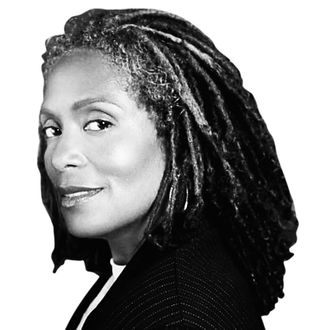
I saw a statistic that only 13 percent of media people are minorities. So it follows that minority views are underrepresented?
Well, certainly! That’s the world that we live in. Earlier this year, I attended a breakfast, let’s call it a discussion, on race. It centered on a new book by Jim Wallis, America’s Original Sin: Racism, White Privilege, and the Bridge to a New America. So there we are, I don’t know, fifty people. Five blacks. Two women, three men. And I said: Really?
And do you find the same problem in the media?
That represents media, too. I have had the opportunity, and have worked in mainstream media, but I knew it wasn’t for me because my perspective was always different. I could write, and when I went home, I wouldn’t feel good. These crimes that you refer to as “new crimes” are not new crimes. They have been going on all the time, and we, meaning black people and brown people, have been telling that side of the story, have said, “No, we really were innocent in this,” and of course we do terrible crimes too, like everybody else, but in this situation, where you’re innocent, and the police took advantage of their authority, we have cried out and said, “No, this was unjust.” So it was never accepted. We were accused of calling the race card, and never even consulted — the police’s word was always taken as fact. The difference now is that we have technology. The cell phone primarily, which is able to capture these things. Then of course we have the cameras in the police cars, on their person. We have all this now. Which captures and brings a different perspective. That’s what I’m talking about when I talk about systematic racism. These things are handed down, it’s the way things are done. Whether we call it the blue code or the code blue or whatever it is, it’s like, okay. It’s even written in the police SOP; their contract states that, yes, the police can recant their story even though they said this first, because things were happening so quickly. So what do police say all the time? They always, it’s like our Fifth: They’re like, “Oh, I feared for my life.” Right?
Self-defense.
And then, I thought he had a gun in his pocket, or he looked like — whatever. We just understand how that particular group has manipulated their rights within the law.
What would be an example of a story that should have been reported differently?
The Freddie Gray incident that took place in Baltimore. What people don’t get is, if you are a black male, and you live in an underserved community, and if you see the police, you know that you’re fair game. They might just stop you. You see this stuff on television, that stuff is real. Now, he hadn’t done anything, and that’s what’s so interesting. They started chasing him. I don’t know if you remember the story. And then they had to come up with a statement, “Well, he had a knife.” But you didn’t see the knife in the first place, why did you start chasing him? Do you understand what I’m saying? Or we could look at Trayvon Martin. But anyway, the thing is — is it your police antenna went up, or is it your response or your reaction to a stereotype? Then when you wrestled him down, you have him on the ground, is that being handled properly? What happened, what transpired to even get to that? Now, my natural visceral reaction is that if that was a white male, they probably wouldn’t even have chased after him. Those are the distinguishing differences, or detailed differences, and how you handled him would have been different. That doesn’t mean that you may not have some resistance, but I would sort of resist it. It happened to me in college.
It sounds like, from your perspective, that the biggest difference in coverage would be in reporting on crime, criminal justice.
That’s a big one, yes.
You could have a newsroom filled with 100 white non-racist, very progressive-minded people who deeply care about and maybe even are well informed of black history and the black struggle. But that’s not the same thing as having a newsroom with a black perspective.
Oh, absolutely not. And guess what? I don’t expect you to. But I do expect or would like you to say, “Hey, well, Kai, what’s your take on this?”
Right.
Just like when you’re coming up with a whole other idea, and I would say, “Well, I think we need to check into such and such.”
So there are stories that the mainstream press is missing because of under-representation?
Oh, absolutely.
What would be an example?
Well, okay. So I went to another event. Sun-Times was represented and Crain’s Chicago Business were there. And there was this same kind of discussion. And so Crain’s was talking about the banks story, and the editor was there and he said all the of the Chicago black banks weren’t on the radar. So the audience, which was black, reacted. And here’s why. He was comparing apples to oranges. You cannot compare Chase, Bank of America, Northern Trust, whatever, to the small black banks in the community. However, that small black bank is still large enough to be the main provider of loans to black business start-ups. That’s an important story! Because you’re doing what you have to do and contributing to the growth of your community based on what you have. So, no, they don’t have the same kind of assets that these world banks have. But their story is viable and it’s important. But it would never have been considered because it didn’t meet the same financial standard.
If black people aren’t in the newsroom or the editorial board meeting to share their experiences and their perspective, it effectively doesn’t exist.
There you go. And that’s why Ralph Ellison wrote Invisible Man. Because he was nonexistent.






























